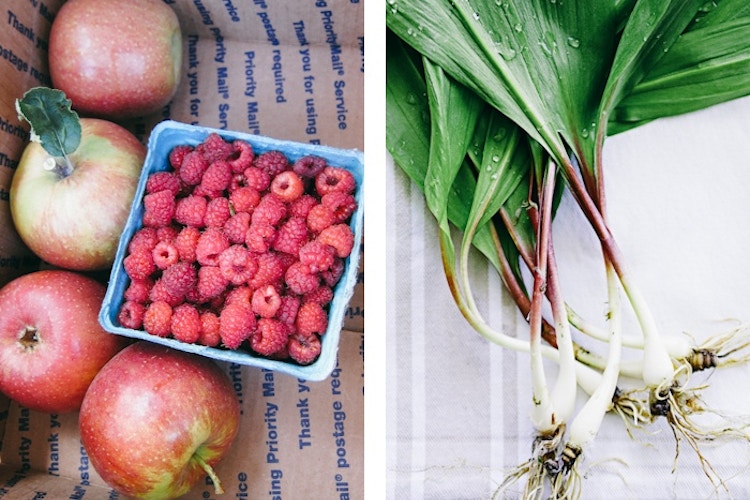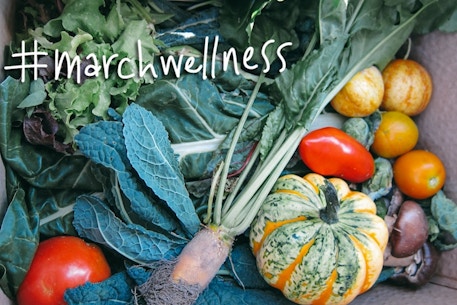March Wellness: Getting Started
So you've decided to join us in our #marchwellness campaign - hooray!! You've been wanting to eat healthier, work out more, and just feel better in general, but you've lacked the motivation. Or maybe the time or the resources. But March is a new beginning and you're ready to make some changes. So now what?!
Our inspiration for #marchwellness is a bit different than for many of you, given that we are dealing with a chronic illness. For Brandon and me, how we eat can actually make a big difference in whether he gets well or stays sick. But even if you're not dealing with an illness, making healthy lifestyle choices now can make you feel better and help prevent future health problems. But what does "healthy" even mean? These days, it seems there are millions of opinions on the subject, many of them conflicting. If you've ever spent time researching the various healthy eating plans out there (caveman or vegan? whole grains or no grains? raw or cooked?), you may end up convinced that there's nothing safe to eat. My brother recently sent me this a tongue-in-cheek blog post on the subject called The Terrible Tragedy of the Healthy Eater. Read it and laugh. (Or weep!)
Let me just say, first of all, that I do not have all the answers. I'm not a nutritionist (though I am currently taking online nutrition classes through the University of Florida at the prompting of my dear husband!), but I am an avid researcher and have done quite a bit of experimenting in my kitchen. I just want to share a few simple principles with you all that have worked for us, and that can hopefully help you feel your best! Secondly, I'm not advocating a diet here. #marchwellness is not about weight loss, though once you start eliminating empty calories and foods that cause inflammation, you may find that you lose a few pounds in the process. I just want everyone to focus on building good habits in March that will hopefully carry into the rest of your life!

Photo by Signe Birck; top right photo (of ramps) above was taken by Signe as well.
Here are the principles of #marchwellness:
1) Eat as many nutrient-rich whole foods (fruits, vegetables, lean proteins, grains, nuts, etc.) as possible.
2) Try and avoid processed foods, fried foods, white carbs (white flour, white sugar, white potatoes, white pasta), dairy, gluten, and alcohol.
3) Drink lots of water - according to the Mayo Clinic, men need about 3 liters a day (that's 99 ounces) and women need 2 liters a day (66 ounces). Even mild dehydration can cause fatigue.
4) Stay active, whether that means walking, running, biking, dancing, swimming, yoga - do what you enjoy! Just get moving, and try and do it 3 of 4 times a week, for 30 minutes a session.
5) And last, try and get eight hours of sleep a night (or whatever is your ideal amount of sleep). Yes, I know that's challenging, but it's impossible to feel your best when you're sleep-deprived.
WHAT TO EAT:
*Lots of vegetables, cooked and raw (preferably organic, and the more colorful the better)
*Legumes (beans, lentils, chickpeas, etc)
*Lean proteins (eggs, organic poultry, wild-caught fish and seafood; organic red meats are OK but in small amounts - no more than once or twice a week)
*Whole grains (quinoa, farro, millet, brown or black rice, amaranth)
*Fruits (preferably organic)
*Nuts (almonds, walnuts, pecans, and pistachios)
*Heart-healthy fats (from oily fish like salmon, nuts, avocados, and oils like extra-virgin olive oil, grape-seed oil, and coconut oil)
*Lots of water, herbal tea, and kombucha, a fermented tea that has amazing amounts of probiotics to aid with digestion.
*Green juices or smoothies - if you have a juicer of blender, start your day out with a vitamin-packed green drink. Your body will thank you!
(Here's a helpful Anti-Inflammation food pyramid from Dr. Weil to use as a guide.)
WHAT TO AVOID:
*Sugar - As much as I LOVE a good dessert or pastry, sugar is pretty much poison. And these days, it's found in nearly everything we eat. We Americans have been conditioned to eat insane amounts of the stuff, and it not only causes weight gain, but it also suppresses our immune systems and leads to all sorts of illnesses. It's hard to cut out, but I encourage you to go cold turkey on this one. After about a week, I promise your cravings will disappear. In the beginning, when the craving hits, have some dark chocolate (85% cacao) handy and savor a square. The richness will satisfy your craving with minimal sugar. I also love KIND bars: the ones with dark chocolate and sea salt will satisfy a sweet craving with only 5g of sugar.
*Processed foods - Food writer Mark Bittman has a great rule - if it has over 5 ingredients on the label, it's probably best to avoid it. The good thing about avoiding processed foods is that it forces you to cook!!
*Fried foods - I promise you can survive a month with no French fries and donuts!
*White Carbs - i.e. white flour, white sugar, white pasta, white bread, white potatoes. These simple carbohydrates turn right into glucose (sugar) in the bloodstream, causing our energy levels to spike and then crash. Even if you don't go gluten-free, always choose the whole grain version of the above items (which have more fiber and are more slowly absorbed into the bloodstream), and swap out white potatoes with nutrient-rich yams.
*Dairy - I'll be honest, I don't completely cut out dairy. I've tried every type of non-dairy creamer in my coffee (almond milk, soy milk, rice milk, coconut milk) and nothing beats the real thing. So I have some 1% milk in my coffee every morning. I also love eating 2% Greek yogurt (which is high in protein, low in sugar, and full of pro-biotics) for breakfast with some homemade granola and berries. But for #marchwellness I'm cutting out cheese, butter, and most dairy.
*Gluten - For Lyme patients, gluten is a no-no. Rather than buying a bunch of gluten-free snack foods or breads (which are expensive!), we are just cutting out most breads and prepared foods in general. But if we do have a pizza or pasta craving, there are ton of GF alternatives available, like brown rice pasta or GF pizza doughs. One of my favorite foods for breakfast is sprouted bread, like Ezekiel 4:9, toasted with almond butter. I'm still planning to eat this, as the sprouted bread has much less gluten, higher protein, and higher nutrient content than regular wheat bread.
*Alcohol - As much as I LOVE wine, I am cutting back to having it once a week or so during #marchwellness.
*Caffeine - I can't give up coffee in totality, but I'm trying to keep it to one cup of coffee in the morning and switch to herbal tea in the afternoon.
*Sodas - A regular 12-oz can of Coke has 41 grams of sugar, or about 10 teaspoons! Diet soda is no better, as it's full of chemicals. There's really nothing positive to say about sodas - stay away!
I know this is a lot of information to take in so I'll stop for now. Starting tomorrow, I'll have recipes, meal ideas, and more. For now, I've started a #marchwellness Pinterest board where I'll be posting healthy meal ideas each week. Try creating your own #marchwellness boards and pin ideas to share with your friends!
Excited to be sharing the experience with you all! I'd love to hear from you - please send me your #marchwellness questions and stories!!



